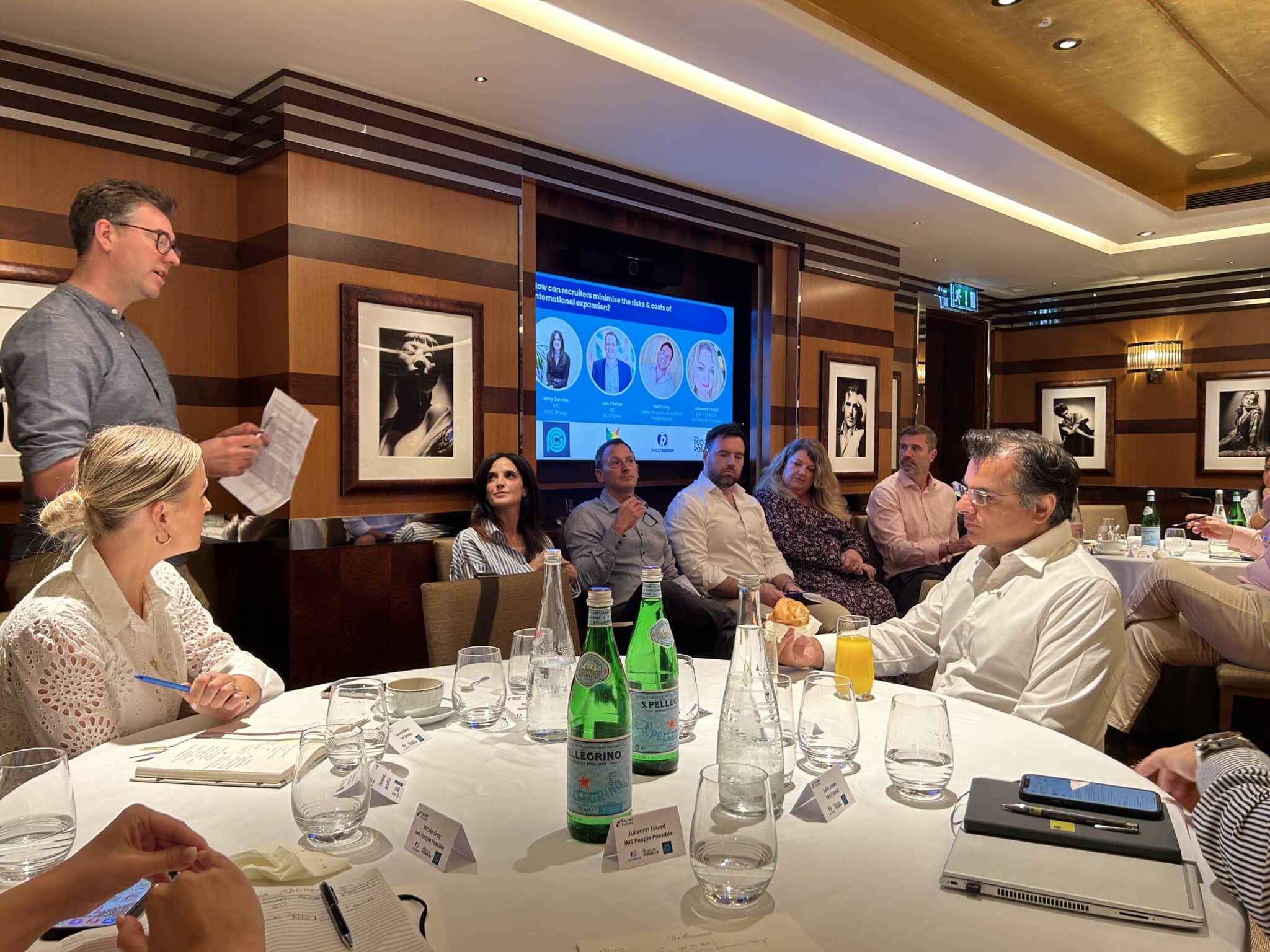How can recruiters maximise international growth opportunities with the best models, services, partners and talent strategies?
As the UK market has cooled, more recruiters are looking for growth overseas, but which markets offer the best rewards and lowest risks?
To answer these and other key questions, TALiNT Partners brought together a panel of recruitment leaders to share their best tactics for success in Europe, the US and MENA alongside leading industry advisors for 30 staffing and talent solutions leaders at The Beaumont Hotel in London’s Mayfair.
Ben Broughton, Founder of Primis, has successfully expanded his business in the US with a combination of events, partnerships and advocacy to engage prospects. “We used Crunchbase to identify prospects and worked with VCs to nominate investees to invite to dinner debates to help us build client relationships,” he explained. “We also built an industry advisory board to help attract guests, endorse our services and advise on how to adapt our solutions for the US market. This included influential figures like the CTO of XPrize.”
One challenge Broughton faced was hiring local talent that didn’t have the all-round BD experience he needed. “We needed to invest time in training local talent to be 360 consultants and understand how to sell the productised solutions we have created for more volume-based hiring.”
Navigating compliance
Nadeem Ahmad, CEO of Templeton & Partners shared his lessons from expanding into mainland Europe. Multilingual teams, cultural awareness, and compliance considerations were at the forefront of his strategy – particularly the latter, as the IR35 equivalents in Germany and the Netherlands – both of which vastly differ – have added cost and complexity. There is a requirement to have a G-account in the Netherlands for tax compliance which affects cash-flow, and the rules in Switzerland require you to employ contractors via a SECO licence.
Multilingual teams, cultural awareness, and compliance considerations were at the forefront of his strategy
In Germany, the workforce is reliable, candidates are unlikely to renege on offers, fees are higher, and clients pay upfront. Nadeem added that contract recruitment for freelancers is lucrative with mid-sized organisations but less ideal with larger entities due to AUG regulations. He also emphasised the need for recruiters to offer solutions tailored to the unique demands of their core markets.
Keith Jones, Regional Sales Director – Europe at NES Fircroft highlighted the company’s successful transition from oil and gas to renewable energy, emphasising the importance of global diversification. One of his key tactics on growing profitably in new markets is using an Economic Value Appraisal (EVA) to determine the true revenue value, and whether it’s worth winning the business in the first place.
NES Fircroft’s model for the Middle East and North Africa (MENA) includes supporting clients with meeting their localisation targets, with a focus on diversity, equity, and inclusion (DE&I) initiatives as well as providing on the ground support for clients who need to mobilize workers seamlessly into a new country and need EOR services.



Offering a prediction for its next growth markets, Jones identified APAC, particularly Taiwan, Indonesia, Thailand, and the Philippines, as markets with high demand. Like Ben and Nadeem, he advised recruiters to offer more productised end-to-end solutions and support, including tech-enabled services, visas and compliance to differentiate and de-risk for clients.
Niche vs. generalist in the US
With US unemployment steady at 3.6%, and workforce growth for the 30th consecutive month in July, it is seen a stable market to scale in for UK recruiters. Amy Davies, Managing Director of PGC Group, specialises in helping UK recruiters expand into the US market, which promises much higher margins from perm and contract recruitment. She urged UK recruiters to start small in a key state and expand as a specialist in high growth sectors like healthcare, tech, renewable energy, life sciences, professional services, finance, and marketing.
Recruiters should offer more productised end-to-end solutions and support, including tech-enabled services, visas and compliance to differentiate and de-risk for clients
Research to find the right state and market opportunity is vital, as each have different tax laws and incentives which have driven the movement of talent to new destinations in recent years. During the pandemic, many individuals in states with exorbitant living costs realised they could maintain their New York salaries while enjoying a lower cost of living by relocating to areas with reduced income tax rates. This phenomenon led to a mass migration of talent into these “opportunity states.”
This has partly driven growth of the contract workforce in the US, with 58m or 36% of workforce now contingent in US according to McKinsey & Co.
Whilst technology is a major enabler of scale, particularly for RPO solutions, Amy did highlight new legislation that has been introduced in New York to regulate the use of AI in recruitment – particularly the sourcing and screening of candidates.
Jon Clarke, Managing Director of 6CATS Pro, provided insights into the impact of legislative and tax changes on market attractiveness, such as the risk of misclassifying workers in countries like Germany and the Netherlands which could lead to criminal prosecution – although IR35 similarities have made these markets attractive to UK recruiters.
Jon observed that more international recruiters are offering Employer of Record services and some UK recruiters are circumnavigating IR35 by using wholly offshore resources. Commenting on growing demand for contingent and other flexible services, he observed that even Belgium and Netherlands, previously renowned for local provision of services requirements, have been forced to adapt to remote and hybrid.
Tech-led expansion
Neil Curry, Sales Director at TargetRecruit, explained how recruiters can enhance their tech stack as a solid base to support international expansion, emphasising the importance of compatibility, integration, and supplier support for key optimisation.
Asked how tech can support scale, Neil said marketplace solutions reassure international clients, for example, leveraging Salesforce for larger scale sourcing solutions offers faith as it’s a renowned, trusted platform to work from. He did point out that recruiters need an internal champion to deploy the right solution for success and buy in and that Automation Workflows rely on a well-maintained database and quality data. If that can be kept in place, roles can be filled with ease.
“Branded-portals, onboarding packages and timesheet use is being used more and recruiters are looking to AI reduce manual intervention for auto-matching hundreds and thousands of candidates, screening, checks and onboarding all quicker and cheaper. You can set up chat GPT on WhatsApp to screen US candidates whilst UK team sleep.”
Trying to find additional tech to support this can have an impact on speed and scale of delivery.
Neil also highlighted the need to mitigate more risks for clients. “You get a comprehensive level of global security and legislation compliance with the Salesforce platform, but not all platforms offer this, so when we’re seeing so many recruiters are taking on more temp / contract work right now, this brings in new risks – especially in overseas markets like DACH & AU and their equivalent of IR35. Trying to find additional tech to support this can have an impact on speed and scale of delivery.”
“Branded-portals, onboarding packages and timesheet use is being used more and recruiters are looking to AI reduce manual intervention for auto-matching hundreds and thousands of candidates, screening, checks and onboarding all quicker and cheaper. You can set up chat GPT on WhatsApp to screen US candidates whilst UK team sleep.”
Julieann Fouad, EVP – Director of IMS People Possible explained the growing trend of recruiters looking at outsourced solutions for their own talent to support international expansion.
“Clients now expect more than just cost savings from outsourced solutions,” she said. “They want long-term partnerships with strategic input and expertise in the markets they are entering. We have seen growing demand for recruitment marketing talent to better leverage data and social media solutions.”
With growing speculation about which roles AI will replace in recruitment, Julieann highlighted the need for expertise in understanding the features and benefits of tech solutions, how things work, good practice and support to implement effective strategies. “IMS has deployed Tech Experts in house to support our clients,” she added.
Compliance, technology and outsourced talent solutions are all enabling recruiters to differentiate and deliver services more profitably whilst helping their clients to de-risk in overseas markets. The best investment for any recruiter looking to expand internationally is research to find the right market, the right niche and the best partner to help them maximise the opportunities.











